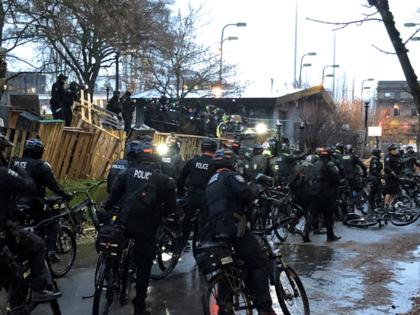Federal oversight of Seattle Police Department ends after 13 years
Published in News & Features
SEATTLE — Full control and oversight of the Seattle Police Department was returned to city officials Wednesday when a federal judge formally ended 13 years of oversight stemming from a lawsuit over police abuses filed by the Department of Justice in 2012.
U.S. District Judge James Robart’s order dismissing oversight is a landmark for the city and the Police Department, which has undergone sweeping changes to its policies, procedures, discipline oversight, data collection and analytics since the DOJ in 2011 released findings of an investigation that found widespread use-of-force abuses by police and disturbing evidence of biased policing.
That investigation found that police used excessive force in one out of every five times officers went hands-on with citizens. The targets of the police abuses were often disturbed, disabled or intoxicated, the investigation found.
Moreover, there was evidence that police engaged in biased policing, however a lack of data prevented the DOJ from making a formal finding.
Today, the department is a national model when it comes to data collection and analyses of crime, oversight — by a trio of civilian-run agencies — and department effectiveness. In addition, police use of force has fallen over the years, although data shows that racial disparities continue.
In a news release Wednesday, the city noted that use of force by officers had decreased significantly after the adoption of new stringent use-of-force policies and reporting requirements in 2014. Data shows that between 2014 and 2019, officers reported using force against citizens about 1,025 times a year. From 2019 to 2024, that number dropped to about 670 incidents per year — a decrease of nearly 35%.
“To put this in perspective, with over 9,200,000 dispatches since the force policy was implemented in 2014, force is reported in only 20 out of every 10,000 dispatches,” about one-fifth of 1% of all calls, the news release said.
Robart was clear that it has been a winding and difficult path to compliance with the federal consent decree. In the past, he has quoted Winston Churchill, stating that the end of oversight marks “the end of the beginning” of police reform in Seattle.
Indeed, the city was found to be in “full and effective compliance” with the settlement agreement in 2016, setting up a trial period that could have ended oversight in two years. However, in 2018 an outside mediator overturned a decision by former police Chief Kathleen O’Toole to fire an officer for punching a handcuffed woman in the face, breaking bones. Video of the incident was shown in court and an incensed Robart found the city had fallen out of compliance with the settlement.
Then in 2020, the Police Department’s violent response to the Black Lives Matter protests after the murder of George Floyd by a Minneapolis police officer, in which dozens of nonviolent protesters were injured, further concerned the court.
One issue that remains unresolved by the court and under negotiation by city officials is officer accountability. Robart for years has urged the city to address the issue, which has been a contentious topic of collective bargaining for years between the city and the Seattle Police Officers Guild.
Last year, however, Robart concluded that the court did not have jurisdiction interfering with the collective bargaining process and that issues surrounding officer accountability were outside his venue. Earlier this year, the City Council passed a new, comprehensive crowd-control ordinance that satisfied the judge and his appointed monitor.
©2025 The Seattle Times. Visit seattletimes.com. Distributed by Tribune Content Agency, LLC.







Comments